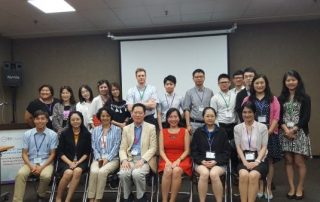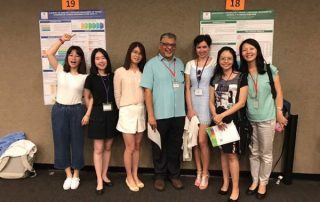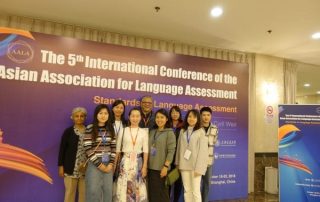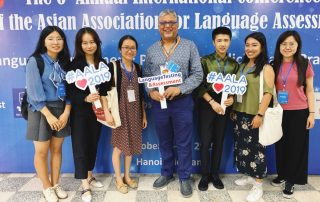Publications
2025
2024
Wallace, M.P., & Lin, J. (2024). Examining EFL motivation during online learning. Asian Journal of Applied Linguistics, 8(1), 15-31.
Wallace, M.P., & Wen, Z.E. (2024). Listening and cognitive individual differences. In E. Batty and E. Wagner (Eds.) Routledge Handbook of Second Language Acquisition and Listening (pp. 55-68). Routledge.
Weng, F., Zhao, C. G., & Chen, S. (2024). Effects of peer feedback in English writing classes on EFL students’ writing feedback literacy. Assessing Writing, 61, 1-13. https://doi.org/10.1016/j.asw.2024.100874
Wu, J., Zhao, C. G., Lu, X., & Jin, T. (2024). A rhetorical function and phraseological analysis of commentaries on visuals. English for Specific Purposes, 73, 33-45. https://doi.org/10.1016/j.esp.2023.09.001
Ye, S.X., Wallace, M.P., Dong, C.J., Shi, L.X., & Yang, B.Y. (2024). Translanguaged practice in listening assessment: L1 vs. L2 responses in recall tasks. Journal of Multilingual and Multicultural Development, 1-15. https://doi.org/10.1080/01434632.2024.2385719
Zhao, C. G., & Wu, J. (2024). Voice and voicing strategies across native and second language writing: Extending the interactional metadiscourse framework. Applied Linguistics, https://doi.org/10.1093/applin/amae021
Zhao, C. G. (2024). Assessing writing. In A. J. Kunnan (Ed.), The Concise Companion to Language Assessment (pp. 168-180). Wiley.
2023
Chen, S., Wallace, M.P., Ho, S.I., Chen, Y., Wong, K.L., & de Oliveira, S.C. (2023). Foreign language listening comprehension and listening anxiety. TESL-EJ, 27(2). https://doi.org/10.55593/ej.27106a9
Liao, L., Ye, S. X, & Yang, J. (2023). A mini review of communicative language testing. Frontiers in Psychology, 14. https://doi.org/10.3389/fpsyg.2023.1058411
Kunnan, A. J., Qin, C. Y., & Zhao, C. G. (2023). Developing a scenario-based English language assessment in an Asian university. Language Assessment Quarterly, 19(4), 368-393. https://doi.org/10.1080/15434303.2022.2073886
Qi, Q., & Zhao, C. G. (2023). Discoursal scholarly identity in research writing. Journal of Second Language Writing, 62, 1-9. https://doi.org/10.1016/j.jslw.2023.101052
Wallace, M.P., & Ke, H. (2023). Examining the content alignment between language curriculum and a language test in China. TEFLIN, 34(1), 116-135. http://dx.doi.org/10.15639/teflinjournal.v34i1/116-135
Wallace, M.P. & Ng, J.S.W. (2023). Fairness of classroom assessment approach: Perceptions from EFL students and teachers. English Teaching and Learning, 47, 529–548. https://doi.org/10.1007/s42321-022-00127-4
Wang, X., Liu, Q., Pang, H., Tan, S.C., Lei, J., Wallace, M.P., & Li, L. (2023). What matters in AI-supported learning: A study of human interactions using cluster analysis and epistemic network analysis. Computers & Education, 194, 104703. https://doi.org/10.1016/j.compedu.2022.104703
Weng, F. (2023). English teachers’ writing assessment literacy: Surveying teachers’ knowledge, beliefs, and practices in China. Porta Linguarum, 40, 57-74. https://doi.org/10.30827/portalin.vi40.23812
Weng, F., Ye, S.X., Xue, W. (2023). The effects of peer feedback on L2 students’ writing motivation: An experimental study in China. Asia-Pacific Education Researcher, 32(4), 473-483. https://doi.org/10.1007/s40299-022-00669-y
Ye, X.S., Shi, J. (2023). Investigating the potential of changing the smartphone system language to L2 for facilitating vocabulary learning and motivation. Language Teaching Research, early view online. https://doi.org/10.1177/13621688221145565
Ye, S. X., Shi, J., Liao, L. (2023). An evaluative review of mobile-assisted L2 vocabulary learning approaches based on the Situated Learning Theory. Journal of Curriculum and Teaching, 12(3), 19-24. https://doi.org/10.5430/jct.v12n3p19
Zhao, C. G., & Qi, Q. (2023). Implementing learning-oriented assessment (LOA) among low-proficiency EFL students. TESOL Quarterly, 57(2), 566-594. https://doi.org/10.1002/tesq.3167
2022
Chen, M.H., Ye, S.X., Jingxin, H., Yao, D.D. (2022). The effect of pragmatic instruction on developing leaerners’ use of request modifiers in the EFL context. World Journal of English Language, 12, 74-85. https://doi.org/10.5430/wjel.v12n8p74
Gao, F., Wang, J., Zhao, C. G., & Yuan, Z. (2022). Word or morpheme? Investigating the representation units of L1 and L2 Chinese compound words in mental lexicon using a repetition priming paradigm. International Journal of Bilingual Education and Bilingualism, 25(7), 2382-2396. DOI: https://doi.org/10.1080/13670050.2021.1913984
In’nami, Y., Koizumi, R., Cheung, M.W.-L., & Wallace, M.P. (2022). Examining second language listening and metacognitive awareness: A meta-analytic structural equation modeling approach. Language Learning. Early view online. https://doi.org/10.1111/lang.12548
Kunnan, A. J., Qin, C. Y., & Zhao, C. G. (2022). Developing a scenario-based English language assessment in an Asian university. Language Assessment Quarterly, 1-26. https://doi.org/10.1080/15434303.2022.2073886
Li, L., Wang, X., & Wallace, M.P. (2022). I determine my learning path, or no? A study of learner control in online video-based learning. Frontiers in Psychology, 13, 973758. https://www.doi.org/10.3389/fpsyg.2022.973758
Liwei, N., Wang, X., Wallace, M.P., Pang, H., & Xu, Y. (2022). Digital learning of EFL among young learners: How are approaches to learning linked to digital competence and technostress. Journal of Computer Assisted Learning, Early view online. https://doi.org/10.1111/jcal.12679
Su, H. (2022). Foreign language enjoyment and classroom anxiety of Chinese EFL learners with intermediate and low proficiency. Journal of Language Teaching and Research, 13(1), 101-109. https://doi.org/10.17507/jltr.1301.12
Wallace, M.P. (2022). Individual differences in second language listening: Examining the role of knowledge, metacognitive awareness, memory, and attention. Language Learning, 72, 5-44. https://www.doi.org/10.1111/lang.12424
Wallace, M.P. & Ng, J.S.W. (2022). Fairness of classroom assessment approach: Perceptions from EFL students and teachers. English Teaching and Learning. https://doi.org/10.1007/s42321-022-00127-4
Wang, X., Pang, H., Wallace, M.P., Wang, Q., & Chen, W. (2022). Learners’ perceived AI presences in AI-supported learning: A study of AI as a humanized agent from Community of Inquiry. Computer Assisted Language Learning. https://doi.org/10.1080/09588221.2022.2056203
Weng, F., Shen, B. (2022). Language assessment literacy for teachers. Frontiers in Psychology, 13, 1-7. doi: 10.3389/fpsyg.2022.864582
Yao, D., Liao, L., & Ye, X. (2022). Investigating the construct validity of an ESL test for young learners. World Journal of English Language, 12(5), 59 – 65. https://doi.org/10.5430/wjel.v12n5p59
Ye, X.S., Shi, J. (2022). Comparing the impact of word writing and typing via mobile devices on L2 vocabulary learning. Educational Studies. https://doi.org/10.1080/03055698.2022.2132815
Zeng, Y., Lu, Q, Wallace, M.P., Guo, Y., Fan, C-W, & Chen, X. (2022). Understanding sustainable development of English vocabulary acquisition: Evidence from Chinese EFL learners. Sustainability, 14, 6532. https://doi.org/10.3390/su14116532
Zeng, Y., Wallace, M.P., Fan, C-W., & Guo, Y. (2022). University students’ attitudes towards English as a lingua franca in a multilingual sustainable society. Sustainability, 14, 4435. https://doi.org/10.3390/su14084435
Zhao, C. G., & Qi, Q. (2022). Implementing learning-oriented assessment (LOA) among low-proficiency EFL students. TESOL Quarterly, 1-29. https://doi.org/10.1002/tesq.3167
Zhao, C. G., & Wu, J. (2022). Perceptions of authorial voice: Why discrepancies exist? Assessing Writing, 53, 1-12. https://doi.org/10.1016/j.asw.2022.100632.
Zhao, C. G. (2022). Theory-based approach to academic writing assessment in higher education: A conceptual framework for assessment design and development. In L. Hamp-Lyons & Y. Jin (Eds.), Assessing the English Language Writing of Chinese Learners of English (pp. 137-154). Springer, Cham. https://doi.org/10.1007/978-3-030-92762-2_9
2021
Ho, A., Yao, D., & Kunnan, A. J. (2021). An analysis of Macau’s Joint Admission Examination-English. The Journal of Asia TEFL, 18(1), 208-222.
Liao, L. (2021). Examining IELTS score consistency across testing sites: The question of test fairness. In ALTE (Ed.), Collated Papers for the ALTE 7th International Conference (pp. 63-66). Madrid, Spain: ALTE.
Liao, L., & Yao, D. (2021, accepted). Grade-related Differential Item Functioning in GEPT-Kids Listening. Frontiers in Psychology.
Qi, Q., Liao, L., & Zhao, C. G. (2021). “I didn’t even know if my students were in class”: Challenges of teaching English speaking online. The Journal of Asia TEFL, 18(4), 1455-1462. http://dx.doi.org/10.18823/asiatefl.2021.18.4.26.1455
Wallace, M.P. (2021). Metacognitive awareness for listening. In M. Reed & T. Jones (Eds.) Listening in the classroom: Teaching students how to listen (pp. 1-12). New York, NY: TESOL Press.
Wallace, M.P., Li, V.M., Cuishi, T.H., & He, N.C. (2021). Metacognitive strategy use for EFL readers: Differences in gender and reading ability. TESL-EJ, 25(2), 1-22.
Wallace, M.P., & Qin, C. Y. (2021). Language classroom assessment fairness: Perceptions from students. LEARN Journal, 14, 492-521.
Yao, D. (2021). Automated Writing Evaluation for Chinese ESL Learners: A Case Study of Pigai System. The Journal of Asia TEFL, 18(3), 940-949.
Yao, D., & Wallace, M.P. (2021). Language assessment for immigration: A review of validation research over the last two decades. Frontiers in Psychology, 12, 773132. https://www.doi.org/10.3389/fpsyg.2021.773132
Yu, C., & Zhao, C. G. (2021c). Continuing the dialogue between writing experts and academic librarians: A conceptual model of information-based academic writing in higher education. Journal of Academic Librarianship, 47(6), 1-8, DOI: https://doi.org/10.1016/j.acalib.2021.102454. [SSCI Q1]
Yu, C., & Zhao, C. G. (2021b). “I won’t try my best”: A narrative inquiry of a Chinese MTI student’s appropriation of graduation policy. Asia-Pacific Education Review, DOI: https://doi.org/1007/s12564-021-09714-9.
Yu, C., & Zhao, C. G. (2021a). A ‘netnographic’ study of test impact from the test-takers’ perspective: The case of a translation test. In ALTE (Ed.), Collated Papers for the ALTE 7th International Conference (pp. 63-66). Madrid, Spain: ALTE.
Zhao, C. G., & Liao, L. (2021). The effect of metacognitive strategy use on L2 writing test performance. System, 98, 1-11. https://doi.org/10.1016/j.system.2021.102472
2020
Wallace, M.P., & Lee, K. (2020). Examining second language listening, vocabulary, and executive functioning. Frontiers in Psychology. https://doi.org/10.3389/fpsyg.2020.01122
Wallace, M. P., & Leong, E. I. L. (2020). Exploring language learning motivation among primary EFL learners. Journal of Language Teaching and Research, 11(2), 221-230. https://www.doi.org/10.17507/jltr.1102.10
2019
Cai, Y., & Kunnan, A. J. (2019). Detecting the language thresholds of the effect of background knowledge on a LSP reading performance: A case of the island ridge. Journal of English for Academic Purposes, 42, x-xx.
Kunnan, A. J. (2019). An agenda for language assessment research and pedagogy. The Journal of Asia TEFL, 15(1), 327-333.
Kunnan, A. J., & Liao, L. (2019). Modeling young learners’ self-assessment, learning attitude, and test performance. The Journal of Asia TEFL, 15(2), 701-710.
Kunnan, A. J., & Saville, N. (2019). Multilingualism and language assessments. In A-B Wendy & J. Bellamy (Eds.), The Cambridge Handbook of Language Standardization (pp. xx-xx). Cambridge, U.K.: CUP. [in press]
Liu, C., & Yu, C. (2019). Understanding students’ motivation in translation learning: A case study from the self-concept perspective. Asian-Pacific Journal of Second and Foreign Language Education, 4(4), 1-19.
Zhao, C. G. (2019). Chinese EFL learners’ perception of the construct of English academic writing. In R. Damerow & K. Bailey (Eds.), Chinese-speaking learners of English: Research, theory, and practice (pp.81- 95). Routledge. https://www.taylorfrancis.com/books/e/9780429290848
Zhao, C. G. (2019). Writer background and voice construction in L2 writing. Journal of English for Academic Purposes, 37, 117-126. DOI: https://doi.org/10.1016/j.jeap.2018.11.004 [SSCI-Q1]
Zhao, C. G. & Lyu, Y. (2019). The construct of EFL academic writing: From the perspective of Chinese undergraduates of English. Foreign Languages and Their Teaching, 309 (6), 69-79. [CSSCI] http://112.126.70.247/wy/CN/Y2019/V01/I06/69
Zhao, C. G., & Liu, C. J. (2019). An evidence-based review of Celpe-Bras: The exam for certification of proficiency in Portuguese as a foreign language. Language Testing, 36(4), 617-627. DOI: https://doi.org/10.1177/0265532219849000 [SSCI-Q1]
2018
Cai, Y., & Kunnan, A. J. (2018). The inseparability of content knowledge from LSP ability: Evidence from modeling of bifactor-MIRT based scores. Language Assessment Quarterly, 14(2), 1-21.
Goh, C. C. M., & Wallace, M. (2018). Lexical segmentation in listening. In J. I. Liontas (Ed.), The TESOL Encyclopedia of English Language Teaching. https://www.doi.org/10.1002/9781118784235.eelt0603
Kunnan, A. J. (2018). Evaluating language assessments. NY, NY: Routledge.
Wallace, M. P. (2018). Fairness and justice in L2 classroom assessment: Perceptions from test takers. The Journal Asia TEFL, 15, 1051-1064. https://www.doi.org/10.18823/asiatefl.2018.15.4.11.1051
Zhao, C. G. (2018). Writer background and voice construction in L2 writing. Journal of English for Academic Purposes, 37, 117-126. DOI: https://doi.org/10.1016/j.jeap.2018.11.004
2017
Kunnan, A. J. (2017). Large scale language assessment: Empirical studies. In E. Hinkel (Ed.), Handbook of research in second language learning, 2nd Ed. (pp. 476-489). NY, NY: Routledge.
Kunnan, A. J., & Carr, N. (2017). A comparability study of the GEPT-Advanced and iBT (TOEFL). Language Testing in Asia, 7, 1-16.
Wang, X., Wallace, M.P., & Wang, Q. (2017). Rewarded and unrewarded competition in a CSCL environment: A coopetition design with a social cognitive perspective from PLS-SEM analyses. Journal of Computers in Human Behaviors, 72, 140-151. https://doi.org/10.1016/j.chb.2017.02.045
Zhao, C. G. (2017). Voice in timed argumentative essay writing. Assessing Writing, 31, 73-83. DOI: http://dx.doi.org/10.1016/j.asw.2016.08.004 [SSCI-Q1]
2016
Hoang, G., & Kunnan, A. J. (2016). Automated essay evaluation for English language learners: A case study of My Access. Language Assessment Quarterly, 13(4), 359-376.
Kunnan, A. J. (Ed., 2016). Talking about language assessment: The LAQ interviews. NY, NY: Routledge.
Liu, S., & Kunnan, A. J. (2016). Investigating the application of automated writing evaluation to Chinese undergraduate English majors: A study of WriteToLearn. CALICO Journal, 33, 71-91.
Sims, J., & Kunnan, A. J. (2016). Developing evidence for a validity argument for an English placement exam from multi-year test performance data. Language Testing in Asia, 6, 1-14.
Zhao, C. G. (2016). ‘Authorial voice’ in the assessment of writing. In D. Tsagrai & J. Banerjee (Eds.), Handbook of Second Language Assessment, (pp. 397-412). Boston/Berlin: De Gruyter.
Zhao, C. G. (2016). The role of voice in L2 argumentative writing: The development and validation of an analytic rubric. In M. A. Christison & N. Saville (Eds.), Studies in Language Testing (SiLT), volume 46. Advancing the Field of Language Assessment: Papers from TIRF Doctoral Dissertation Grantees 2009 – 2013 (pp. 24-56). Cambridge, UK: University of Cambridge Local Examinations Syndicate.
Projects
Completed Projects:
Examining the effects of individual differences and task difficulty on listening comprehension
Project funded by University of Macau, 2022-2023.
Improving English communication in Macau: An examination of strategy efficiency
Project funded by Specialized Subsidy Scheme for Macao Higher Education Institutions in the Area of Research and Social Sciences of Higher Education Fund, 2021-2023.
Individual differences in L2 listening comprehension
Project funded by the University of Macau, 2020-2023.
L2 listening teaching and assessment practices
Project funded by the University of Macau, 2020-2022.
Chinese placement test development for the Confucius Institute
Project supported by the University of Macau, 2020-2021.
Evaluating English language assessments using a fairness-based framework.
The project is funded by the University of Macau, 2017-2020.
Language assessment for immigration, citizenship, and asylum.
The project started in December, 2018.
Assessing literacy among language teachers in schools in Macau and Goa
The project was funded by the University of Macau, 2016-2019.
A survey of English language proficiency among young learners in Chinese-speaking cities.
The project was funded by the Language Training and Testing Center (LTTC), Taipei, Taiwan, 2016-2017.
(Click here to see the report: Completed report)
An on-line test of academic English (TAE) for use at the University of Macau.
The project was funded by the VRAA’s office at the University of Macau.






